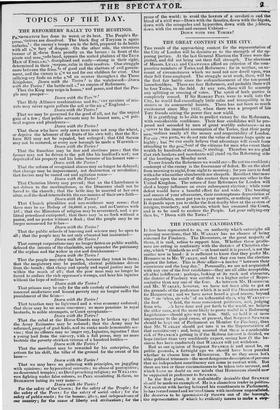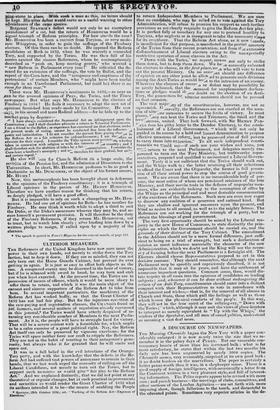THE FINSBURY CANDIDATES.
Ir has been represented to us, on authority which outweighs all opposing assertions, that Mr. WAKLEY has no chance of being
returned for Finsbury. The Dissenters, or the great majority of them, it is said, refuse to support him. Whether these gentle- men are acting in conformity with the dictates of Christian dm- rity, which " thinketh no evil"—at least until it is proved, is not the matter now in hand : it is sufficient to know that they prefer Mr. HOBHOUSE to Mr. WAKLEY, and that they can turn the election against the latter. This is their afliiir—a matter " between their conscience and the long day." Personally, we are not acquainted with any one of the four candidates—they are all alike acceptable, all alike indifferent : perhaps, looking at its rank and character, the district of Finsbury was entitled to a higher order of Repre- sentative than any one of the four. As between Mr. IlonnoesE and Mr. WAKLEY, however, we have not been able to get at the grounds of the preference which it is said the Dissenters avow for HonHousE ; and we have never heard a good reason, beyond. the " sic ;ubeo, sic volo" of an influential class, why WAKLEY-
the first 'le field, the more consistent politician, and, judging from have done and put forth to the world, we believe the abler man, and the more likely to prove useful in a Reforming Legislature—should give way to him. Still, we hold it of more importance to the good cause, at present, that Sergeant SPANKIK should be kept out of Parliament as Member for Finsbury, than that Mr. WAKLEY should get into it as the Representative of that constituency : and, being assured that the:•e is cmsidemble risk of SPANKIE'S getting in if the Reform interest is divided, we hope (rather than very confidently expect, seeing how ill the bu- siness has been conducted) that WAKLEY will yet withdraw.
Bad as our opinion of Sergeant SP4NK1E is and must be, on public grounds, a fortnight ago we should have been puzzled whether to choose him or HOBHOUSE. To us they seem both alike political trimmers—the most dangerous description of persons that an independent constituency can come in contact with. But there are two or three circumstances to be taken into account, and which leave no doubt on our minds that HonnousE should now be supported in preference to SPANK1E. In the first place, it is undoubtedly desirable that SPANKIK should be made au example of. He is a shameless trader in politics. Not content with having betrayed his constituents in Parliament, In-has turned round and Ice: u red them with insolence unparalleled. Ile deserves to be ignomieieu sly thrown out of the borough, the representation of which hi evidently means to make a step-
Ring-stone to place. -Viith slush a man as this, no terms should ee kept. His utter defeet would serve as a useful warning to other adventurers at the save species. Sergeant SearsEnt a defeat would not only be se exemplary
punishment of' a rat, but the return of Holutousic would be a signal triumph of Reform principles. For how stands the case? Mr. Hoeitoun has been a convert from Toryism, or vow mode- rate Whiggism, in order to gain the suffrage of the Finsbury electors. Of this there can be no doubt. He opposed the Reform candidates at Bath in 1832, when he was scarcely a concealed Tory, and supported by the Tories. He was then full of his sneers against the sincere Reformers, whom he contemptuously described as "push on, keep moving gentry," who wanted a " new Reform in Parliament every year!" He ridiculed the de- mand for an extension of the suffrage, the vote by Ballot, and the repeal of the Corn-laws, and the "arrogance and emptiness of the pretensions" of certain Members, who "might have been useful enough in an Unreformed Parliament, but (said he) Mere is no room for them now."*
These were Mr. HOBHOUSE'S sentiments in 183.2,—as near as
.can be the avowed opinions of PEEL, the Tories, and the Times newspaper. But what says Mr. HOBHOUSE to the electors of Finsbury in 1834? He finds it necessary to adopt the new set of .opinions furnished him ready-made by his Committee. He now
s, in his second and more Radical address—for he bids up to the market-price by degrees-
-4' I have always considered the Septennial Act an infringement upon the Constitution ; and I shall therefore advocate a return to Triennial Parliaments. I am a friend to the Ballot ; as experience has convinced me that elections, under jhe present mode of voting, cannot be conducted free from the influence 4 power and intimidation. I do not consider the present Rate-paying clatr...es in
"..
the Reform Act as a fair criterion for enfranchisement ; I am theefore an advocate fur their repeal. I consider the Tithe system most perniciod; whether taken in connexion with religion or with the interests of...:te country; and I ihall therefore seek the abolition of tithes by .a fair - ...ummutation. I consider the Corn-laws a landlord's monopoly ; and al..% therefore for their gradual, but earl" and certain repeal."
He also will "vote for Church Reform rib a large scale, the restisiSAI of the Pension-list, and the admission of Dissenters to the Universities. In short, Mr. HOBROUSE professes to be as good a Durhamite as Mr. DUNCOMBE, or the object of his former sneers, Mr. HUME I Now, this metamorphosis has been brought about in deference to the opinions of the Finsbury constituency: it is a triumph of Liberal opinions in the person of Mr. HENRY HOBHOUSE. Therefore we have another reason for thinking that his return, so deeply pledged, will have a good effect.
But it is impossible to rely on such a changeling as Mr. OR-
novsE. He had one set of opinions for Bath—he has another for Finsbury. He may think it worth while to adapt a third to suit the Duke, or the Duke's successors whoever they may be, and se- cure himself a permanent provision. It will therefore be the duty of the Finsbury Reformers, if they return Mr. HontrousE, not to trust, but to watch him closely ; after binding him down by a written pledge to resign, if called upon by a majority of the electors.
• The speech is quoted in Fraser's Magazine for the current month, at page 113.































 Previous page
Previous page